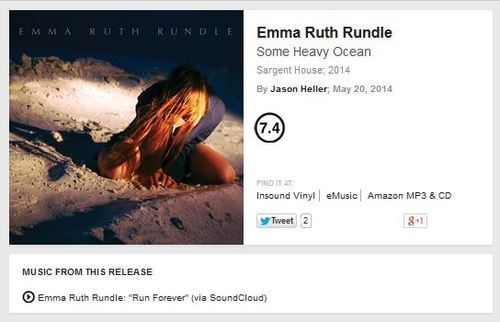To date, Emma Ruth Rundle’s stabs at crafting a musical identity have been tentative ones. As the frontwoman of the L.A.-based projects the Nocturnes and Marriages, her eerie voice has been all but smothered by male accompanists, prog denseness, cyclonic distortion, or her own hushed delivery. The fact that she’s a stunningly supple and versatile guitarist—her skills are a vital component of the post-rock ensemble Red Sparowes—hasn’t given her that much reason to step up her vocal game. Even her previous solo material has been guitar-centric and mostly instrumental. But Rundle’s new solo album, Some Heavy Ocean, is different. She not only sings, she does so a lot—and when she does, she soars.
That’s not to say the album sounds triumphant. Some Heavy Ocean is a black hole of anti-happiness, a heart-shaped growth of dark matter. Veins of inky folk run through “Shadows of My Name” and “Oh Sarah”, songs that encompass the scope of Rundle’s acoustic prowess: On the former, she attacks her strings as if they’re barbed wire that must be breached with her bare hands; on the latter, she fingerpicks with fluid delicacy. As sharp and vivid as her playing is, though, the clouds are always near. Swathes of strings and overdriven twang cast long shadows, and the intermittent drums rattle like bones in a box. Even the two brief, ethereal interludes, “Some Heavy Ocean” and “Your Card the Sun”, seem more like frozen chunks of time than mere placeholders. Far more than anything she’s done prior, the album is a dynamic, breath-snatching statement of intent that’s part lullaby, part night terror.
The biggest leap found on Some Heavy Ocean is Rundle’s voice. On “Shadows of My Name,” her reverb-shrouded vocals dart in and out of the mix, flashing fragments of language rather than distinct lines; in the chorus, she works herself up into nerve-pinching growl that’s recalls Björk at her most unhinged. Throughout the rest of tracks—particularly the mournful yet urgent “Run Forever”—Rundle’s comes across like a student of both Chelsea Wolfe’s frigid intonation and Marissa Nadler’s gloomy coo. As a singer, Rundle now sounds whole, and better yet, she’s gravitated toward a timeless resonance. The post-metal and shoegaze sounds she’s employed before have been left for something broader. When, on “Haunted Houses”, she warns of a distance that must be kept between her and the unnamed target of her simmering wrath, she evokes Stevie Nicks; having another song titled “Oh Sarah” only reinforces that impression, although that track’s candlelit, folk-rock balladry bears just a vague kinship to Fleetwood Mac’s “Sara”.
Rundle’s lyrics, where they can be fully pieced together, are the weakest element of Some Heavy Ocean. There are only so many mentions of ghosts and graveyards that a record can take before it starts to feel cartoonishly goth, even when those motifs are woven into the music with such conviction and subtle shades of mood. That atmosphere works best when it strips away any hint of pale cliché and plunges under the ice; “Living with the Black Dog” is a droning, distorted, shadow-draped leviathan of a song, one in which Rundle breaks away from spooky folk and edges closer toward Earth’s recent forays into chthonic Americana. Not only does it conclude the album on an ominous, ambitious note, it reconciles every medium she’s worked in so far: melody, noise, softness, severity, and a sense of quiet drama and melancholy. Some Heavy Ocean stands as Rundle’s first fully realized release as a singer-songwriter—and while its monochrome scale is narrow, she makes harrowing grays out of it.

